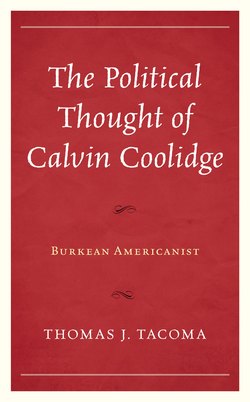Читать книгу The Political Thought of Calvin Coolidge - Thomas J. Tacoma - Страница 15
На сайте Литреса книга снята с продажи.
The Historical School and Historicism
ОглавлениеThe historical mode of thinking did not begin in the nineteenth century. But the idea that truth could only be understood when placed in its proper historical context took root and grew to its intellectual maturity in the nineteenth century and was by the 1890s regnant among academics and public intellectuals. Perhaps of greatest influence was the Hegelian philosophy of history. While Hegel’s ideas were not imported directly and wholesale into American higher education, they were mediated through early students of Hegel and then by later generations of Americans who studied under Hegel’s disciples in Germany.[19]
The historical school taught that human institutions must be understood as existing in time. They were not ahistorical abstractions but should be understood on the basis of their concrete existence. Leading Progressive academic Woodrow Wilson took this idea over from the British student of English constitutionalism, Walter Bagehot. Bagehot, along with other scholars in the late nineteenth century, focused on the historical development of peoples and their political institutions. As Pestritto explains, while “Bagehot’s The English Constitution gives an historical account of the development of the British system, his subsequent Physics and Politics (1873) more broadly paints the history of political development using the terms of evolutionary biology.”[20] Peoples grow and change; their institutions grow with them. The proper way to understand and study those changes is through examining them over time.
For many Progressives, the approach of the historical school formed the basis of their reforms. But for the leaders of the movement, especially Wilson and his followers, the historical school stopped short of a fully developed theory of history that explained past, present, and future. This is where Wilson and company parted ways with John Dewey or the social Darwinists: for Wilsonians, History had an end-state, a goal. More than a series of endless adaptions over time, history had direction toward a destination. This was Wilson’s historicism. Wilson took this idea from his graduate school mentors at Johns Hopkins, who in turn took this conception of history over from Georg Hegel’s students in the German universities.[21]
Hegel had taught in his Philosophy of History that the world was guided by the spirit of reason, which over time was bringing about the progress of mankind toward the rational state and the fully recognized freedom of the individual within it. Accordingly, Hegel interpreted the dialectic of history as progressive: primitive epochs were succeeded by the more advanced. Civilizations at the cutting edge of history overtook and destroyed those who were less advanced, while incorporating whatever progressive elements were contained in those older cultures. Hegelian theodicy argued that the destruction of an historically inferior people actually facilitated the advance of history.[22] As Pestritto again explains, Hegel provided Wilson and the Progressives with the teaching that “Providence guides historical progress, and history represents the gradual unfolding of the Divine Idea on earth and ends in the modern state, which is the culmination of God’s plan.”[23] This interpretation of history contained profound implications for the understanding of human nature and of government. It became impossible to maintain the Lockean position on government—that governments were created on the basis of a social contract of the consenting people in order better to secure their rights and happiness—in the face of the Hegelian reading of historical progress. Moreover, since nature itself is growing and changing with the spirit of history, it becomes impossible to speak of timelessly transcendent “natural laws” or “natural rights.”[24]
